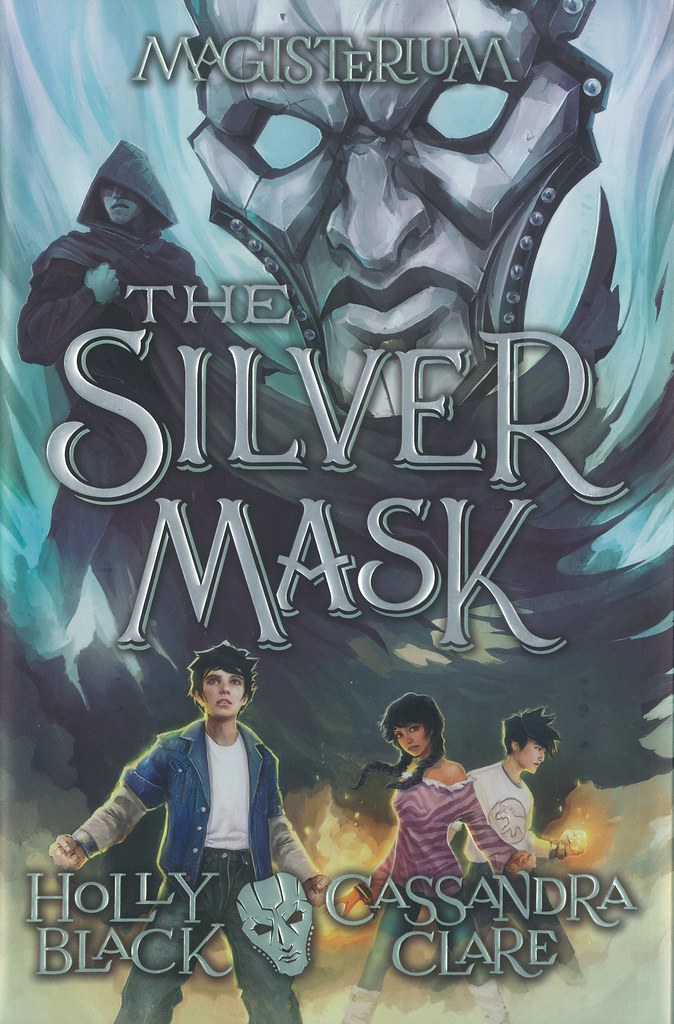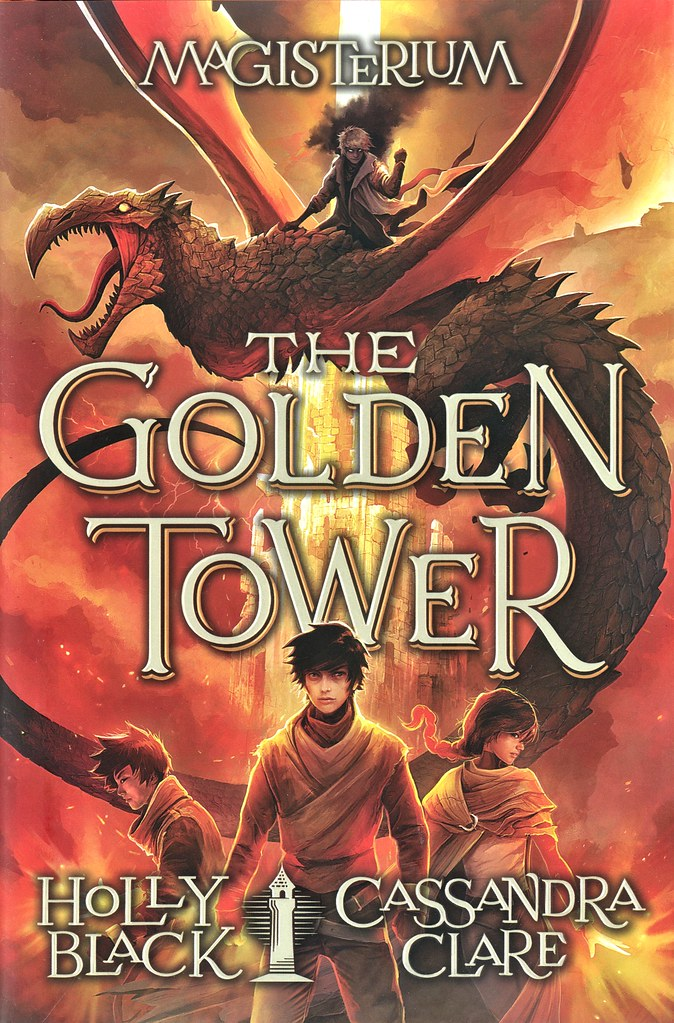Title of the work
Country of the First Edition
Country/countries of popularity
Original Language
First Edition Date
First Edition Details
Holly Black and Cassandra Clare, Magisterium: The Iron Trial. New York: Scholastic, 2014, 295 pp.
Holly Black and Cassandra Clare, Magisterium: The Copper Gauntlet. New York: Scholastic, 2015, 264 pp.
Holly Black and Cassandra Clare, Magisterium: The Bronze Key. New York: Scholastic, 2016, 249 pp.
Holly Black and Cassandra Clare, Magisterium: The Silver Mask. New York: Scholastic, 2017, 232 pp.
Holly Black and Cassandra Clare, Magisterium: The Golden Tower. New York: Scholastic, 2018, 239 pp.
ISBN
Official Website
magisteriumtrials.com (accessed: October 21, 2020)
Genre
Fantasy fiction
School story*
Target Audience
Children (middle grade)
Cover

"The Silver Mask" cover by School Library. Retrieved from flickr.com, licensed under CC BY-NC-ND 2.0 (accessed: February 2, 2022).

"The Golden Tower" cover by School Library. Retrieved from flickr.com, licensed under CC BY-NC-ND 2.0 (accessed: February 2, 2022).
Author of the Entry:
Sarah F. Layzell, University of Cambridge, sarahlayzellhardstaff@gmail.
Peer-reviewer of the Entry:
Susan Deacy, University of Roehampton, s.deacy@roehampton.ac.uk
Lisa Maurice, Bar-Ilan University, lisa.maurice@biu.ac.il

Holly Black by AssistantAtHollyBlack. Retrieved from Wikipedia, licensed under CC BY-SA 4.0 (accessed: February 2, 2022).
Holly Black
, b. 1971
(Author)
Holly Black (1971) was born in New Jersey, USA, and published her first book in 2002. She is a bestselling author of more than 30 books and has won several awards and honours, including a Newbery Honor for Doll Bones in 2014. Black is perhaps best known as the author, with Tony DiTerlizzi, of The Spiderwick Chronicles series.
Black lives in Massachusetts, ten minutes away from Cassandra Clare.
Source:
Official website (accessed: October 21, 2020).
Bio prepared by Sarah Hardstaff, University of Cambridge, sflh2@cam.ac.uk

Cassandra Clare by Gage Skidmore. Retrieved from Wikipedia, licensed under CC BY-SA 2.0 (accessed: February 2, 2022).
Cassandra Clare
, b. 1973
(Author)
Cassandra Clare (1973) was born in Iran to American parents and spent much of her childhood travelling. Following a career in magazine journalism, Clare became a full-time author in 2006 and is best known as the author of The Mortal Instruments series, which has been translated into over 34 languages.
Clare lives in Massachusetts, ten minutes away from Holly Black.
Source:
Official website (accessed: October 21, 2020).
Bio prepared by Sarah Hardstaff, University of Cambridge, sflh2@cam.ac.uk
Adaptations
Audiobook:
Holly Black and Cassandra Clare, Magisterium: The Iron Trial, narrated by Paul Boehmer, New York: Penguin Random House, 2014 [audiobook].
Holly Black and Cassandra Clare, Magisterium: The Copper Gauntlet, narrated by Paul Boehmer, New York: Penguin Random House, 2015 [audiobook].
Holly Black and Cassandra Clare, Magisterium: The Bronze Key, narrated by Paul Boehmer, New York: Penguin Random House, 2016 [audiobook].
Holly Black and Cassandra Clare, Magisterium: The Silver Mask, narrated by Paul Boehmer, New York: Penguin Random House, 2017 [audiobook].
Holly Black and Cassandra Clare, Magisterium: The Golden Tower, narrated by Paul Boehmer, New York: Penguin Random House, 2018 [audiobook].
Braille:
Holly Black and Cassandra Clare, Magisterium: The Iron Trial, Peterborough, England: Royal National Institute of Blind People, 2015 [Braille].
Ebook:
Holly Black and Cassandra Clare, Magisterium: The Iron Trial, New York: Scholastic, 2014 [ebook].
Holly Black and Cassandra Clare, Magisterium: The Copper Gauntlet, New York: Scholastic, 2015 [ebook].
Holly Black and Cassandra Clare, Magisterium: The Bronze Key, New York: Scholastic, 2016 [ebook].
Holly Black and Cassandra Clare, Magisterium: The Silver Mask, New York: Scholastic, 2017 [ebook].
Holly Black and Cassandra Clare, Magisterium: The Golden Tower, New York: Scholastic, 2018 [ebook].
Translation
French editions (France):
- L’épreuve de fer – Magistérium, Tome 1, Pocket Jeunesse, 2015.
- Le gant de cuivre – Magistérium, Tome 2, Pocket Jeunesse, 2016.
- La clé de bronze – Magistérium, Tome 3, Pocket Jeunesse, 2017.
- Le masque d’argent – Magistérium, Tome 4, Pocket Jeunesse, 2018.
- La tour d’or – Magistérium, Tome 5, Pocket Jeunesse, 2019.
French editions (Canada):
- L’épreuve de fer, trans. Marie-Josée Brière, Toronto: Éditions Scholastic, 2014.
- Le gant de cuivre, trans. Marie-Josée Brière, Toronto: Éditions Scholastic, 2015.
- La clé de bronze, trans. Marie-Josée Brière, Toronto: Éditions Scholastic, 2017.
- Le masque d’argent, trans. Marie-Josée Brière, Toronto: Éditions Scholastic, 2018.
- La tour d’or, trans. Marie-Josée Brière, Toronto: Éditions Scholastic, 2019.
Summary
The series follows Callum (Call) Hunt and his friends Aaron and Tamara through their time at the Magisterium school for mages. The trio learn how to harness the magic of the four elements – earth, water, fire and air – along with the paired magics of chaos and the soul.
All the novels draw on ideas from ancient Greek and other classical mythologies about the four elements and chaos. As in other magic-themed school stories, the use of Latin and Greek lends a sense of recognisable difference from everyday life. Finally, references to classical gods such as Zeus and Poseidon, as well as the magical minor gods, the Telchines, evoke ideas about power, magic and destruction.
The Iron Trial opens with Alistair Hunt rescuing his infant son Callum from the site of a massacre at which Callum’s mother has carved the haunting words, “Kill the child”. Callum is alive but his leg has been seriously injured, an injury which has lasting consequences including causing Callum chronic pain throughout the series. We then meet Callum as an adolescent on his way to undertake entrance tests for the Magisterium. Told to fail by his father, who has grown to hate the world of magic, Callum succeeds by accident. One of his new roommates at school, Aaron, is soon revealed to be a Makir, a rare type of mage who can use the element of chaos, making him valuable in the fight against the "Enemy of Death", Constantine Madden. Meanwhile, Callum adopts a Chaos-ridden wolf and hears an unsettling prophecy, raising questions about his own identity. When Aaron is kidnapped, Callum and a third roommate, Tamara, set off in pursuit. While Aaron is rescued, Callum discovers in an encounter with the evil Master Joseph that the Enemy of Death’s soul lives on in him, Callum. He nonetheless chooses to return to school and passes through the Iron Gate, at which point his magic cannot be taken away from him.
Callum’s discovery plagues his summer holiday: The Copper Gauntlet sees him running away from home, convinced that his father knows about his evil soul and is planning to kill him. He spends the rest of the summer with Aaron and Tamara at her house, along with Tamara’s sister Kimiya and her boyfriend Alex Strike. Once back at school, Callum learns of a plot to steal the Alkahest, a glove that can be used to strip a Makir of their magic. He suspects his father, and travels with his friends to find him. They are pursued by metal giant Automatones, and flee, following Alistair’s trail to the Enemy of Death’s mausoleum. Callum’s friends watch in horror as he is able to command an army of Chaos-ridden, undead figures created by the Enemy of Death. In the tomb itself, Alistair confronts Master Joseph, who escapes with the Alkahest. Callum finds himself able to use chaos magic after Constantine’s body is destroyed in the fight; he also cuts off Constantine’s head in order that his father can return to the other mages as a hero rather than a criminal. At the novel’s close, a question mark remains over who sent Automatones after the group – an unknown spy.
Following the dramatic conclusion to Book 2, The Bronze Key opens with Callum and his father travelling to the Collegium to receive an honour. The character of Anastasia Tarquin, an Assembly member, is introduced. Callum receives a note signed by a girl from school, asking him to meet her, but it is a trap and he is nearly crushed by a falling chandelier. The event is disrupted further by the discovery of a dead body – fellow student Jen – floating in the water surrounding the Collegium. Back at the Magisterium, Anastasia arrives, ostensibly to seek out the spy. Callum and Aaron are taught by a group of rogue mages how to use soul magic to see and touch each other’s souls, but this ends in disaster when Callum accidentally turns the murdered Jen into a Chaos-ridden. Callum’s fears of the spy grow when his water supply is sabotaged during a school trial in a maze of fire. Alex Strike tells Aaron and Callum that Tamara has been captured by the spy and lures them out into the woods. Too late, Callum realises that Alex is the spy. Alex has stolen the Alkahest and tries to use it on Callum. Tamara saves Callum and Alex kills Aaron instead, taking his chaos magic and escaping. Callum’s identity as the resurrected Enemy of Death is uncovered, and he is sent to the Mage prison. At the novel’s close, Anastasia visits and reveals that she is Constantine’s mother.
Callum remains imprisoned at the start of the fourth book, The Silver Mask, but soon escapes thanks to a jailbreak spearheaded by Tamara and Anastasia. Anastasia is revealed to be in league with Master Joseph and Alex. The group, including the hapless Jasper, is taken to his island stronghold. After a thwarted escape attempt, Callum is tasked with raising Aaron from the dead. Meanwhile, Callum and Tamara reveal their romantic feelings for one another. They discover an army of Chaos-ridden people waiting underwater in a quarry on the island. Callum discovers that he can bring Aaron back to life using part of his own soul; he brings Aaron back, but Aaron is not the same as he was when alive. Horrified, Tamara and Jasper escape, returning with an army formed by members of the Assembly and Magisterium. Callum goes to parley and is ordered to destroy both Alex and himself. Instead, he advances into battle against his schoolmates, but at the crucial moment, gives the Chaos-ridden army the order to dance instead of fight. Aaron returns Callum’s soul to give him the strength he needs to send Alex into the void. As the novel ends, it is revealed that Aaron’s soul has now taken up residence inside Callum’s head. An epilogue shows Alex returning from the void as a Devoured of Chaos.
The Golden Tower sees Callum back at school for his final year, this time with Aaron inside his head. Despite Aaron and Callum’s literal closeness, Callum rekindles his romance with Tamara. Meanwhile, Alex returns as a Devoured of chaos to attack the Magisterium and issue a series of outlandish demands, including the construction of a golden tower. Aaron discovers a door in Callum’s head; unlocking the door unleashes centuries of memories from the soul of an evil mage who has been moving from body to body since his own untimely death. These memories show Callum how to defeat Alex, by assembling four Devoured representing each of the four elements. As Alex is dying, Callum pushes Aaron’s soul into the body, allowing him to live again. Despite their teacher, Rufus, realising what they have done, Callum, Aaron/Alex and Tamara are allowed to pass through the gate of gold and complete their school education.
Analysis
"Magisterium" is both the series title and the name of the magic school that Callum and his friends attend. This word choice is clearly linked to the Latin words for "teacher" ("magister") and "mastery": one of the core themes of the series is self-control and unlike books where the potential evil is embodied in an external figure, here it resides in Callum himself. The word "magisterium" also means "teaching authority", particularly with reference to the Catholic Church, and is used by Philip Pullman as the name of the oppressive religious authority in His Dark Materials. This gives additional meaning to Callum and his father’s suspicion of the authority claimed by the school. "Magisterium" is also a word associated with alchemy, the source of magic in the novels.
In the first novel, readers are introduced to a system of magic based on control of the four elements. Mages typically specialise in one element, and a rare few are able to use chaos magic. The Iron Trial associates chaos with the “void” (p. 217). In A Dictionary of Creation Myths, David and Margaret Leeming write that chaos is “the Greek word for the dark void of pre‐creation”*: Black and Clare’s chaos reflects ancient mythological understandings and creation stories about chaos as a void that contains the material for creation.
In an author Q&A in The Iron Trial, Black and Clare name the Harry Potter books among their influences, and their series makes similar use of Latin and Greek names. For example, the names "Constantine" and "Verity" are used for characters who take on mythic status within the good versus evil narrative peddled by adults in the magic world. Additionally, Constantine’s name and military ambitions recall Constantine the Great (272/3–337 CE). Constantine was the first Roman emperor to convert to Christianity, linking to themes in the Magisterium books such as resurrection and authority.
Other classically inspired names include Constantine’s mother, Anastasia, whose name means "resurrection" – connecting to her desire to bring back her son – and her colleague, Alma, whose name means "soul" – connecting with her role in teaching Callum and Aaron how to perform soul magic. The Magisterium books also share mythological references and figures (such as the Telchines) with Rick Riordan’s Percy Jackson series, another influence on Black and Clare, and reviewed elsewhere in the database.
Most of the novels contain additional specific classical references, especially Books 2 and 3, which have their own entries in the database. Book 1, The Iron Trial, introduces the novel’s elemental magic system, as well as the mage society’s school system, in which students attend the Magisterium followed by the Collegium. A specific reference comes when Callum adopts a Chaos-ridden wolf pup and names him "Havoc" (p. 229), quoting Mark Antony in Shakespeare’s Julius Caesar: “Cry havoc, and let slip the dogs of war.”
The Copper Gauntlet outlines the chaos origin story in more detail: “Chaos magic came from the void, came from nothing. It was creation and destruction all rolled into one.” (p. 45). Call also learns that the dagger he inherited from his mother, Semiramis, is named after “an Assyrian queen” (p. 50), a historical figure with mythic status. Antiquity also plays a part in an explanation of the elementals: “They are immensely powerful, like the Greek Titans” (p. 86). An escaped metal elemental who later pursues Call and his friends is named Automatones, reminiscent of the robot-like metal creatures of Greek mythology.
The Bronze Key continues the Greek theme. For example, “a giant weird statue of Poseidon” marks the entrance to the underwater Collegium (p. 14). Later Call is attacked by a multi-headed elemental (p.89), reminiscent of a Hydra narrative. This elemental is later named as Skelmis (p. 110). The students later encounter an air elemental called Chalcon (p. 137). In Greek mythology, both Skelmis and Chalcon are among the Telchines, punished for their misuse of magic in the same way Black and Clare’s elementals are. Finally, the maze of fire that appears in this novel (p. 190) recalls the Labyrinth of Greek mythology.
In the final books of the series, The Silver Mask and The Golden Tower, classical references tail off, perhaps because the mage world has been fully established with little further need for comparisons. A notable exception is a reference to Zeus when Call is on the verge of unleashing the full memories and magical powers of the resurrected mage inside his soul: in a dream-memory, Call “lifted his hands and black lightning – chaos lightning – sparked between them… It was as if he were Zeus; he could burn the whole world and it would be easy.” (p. 50). Here, the mythological reference reinforces the novel’s message that great power is also the power to do harm, that control is necessary.
Along with classical references, the novels also refer to figures from Renaissance history and culture, such as the alchemist Paracelsus (Iron p. 60; Bronze p. 17). Neo-classical uses of Latin and Greek are also referenced, for example, the "prima material" of alchemy. Similarly, the mage prison is named the "Panopticon", after philosopher Jeremy Bentham’s design of an institution in which prisoners would be under constant surveillance. This combination of classical and neo-classical references positions the series’ magical society as Eurocentric. This is reinforced by a plaque Call finds in the Collegium, itself built into the Virginia coastline, honouring a mage who died in 1609: 1609 was the year of the Second Virginia Charter, an important colonial document.
So far, there has not been much academic commentary on the series. An exception can be found in Christopher Owen’s doctoral research, which considers Callum in light of his chronic pain, his frequent concerns about whether an activity will hurt or take a long time, and his refusal to allow others to dictate what he can and can’t do. Owen writes that “the text not only emphasizes Callum’s disability, but also foregrounds the systemic ableism of the fictional world.” (p. 213)** Callum’s experience of his school as an oppressive environment works, as do the novels’ plots and classical references, to undermine simplistic binaries of good and evil.
* David Adams Leeming, Margaret Adams Leeming, A Dictionary of Creation Myths, Oxford University Press, 1994/2009.
** Christopher Owen, Systemic Oppression in Contemporary Children’s Fantastika Literature. Unpublished PhD Dissertation, Anglia Ruskin University, arro.anglia.ac.uk, 2019.
Further Reading
Leeming, David Adams and Leeming, Margaret Adams, A Dictionary of Creation Myths, Oxford University Press, 1994/2009.
“Magisterium” in Merriam-Webster.com Dictionary, Merriam-Webster, merriam-webster.com (accessed: October 21, 2020).
Owen Christopher, Systemic Oppression in Contemporary Children’s Fantastika Literature. Unpublished PhD Dissertation, Anglia Ruskin University, arro.anglia.ac.uk, 2019 (accessed: October 21, 2020).
Addenda
Fan website (accessed: October 21, 2020).


